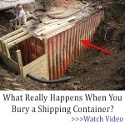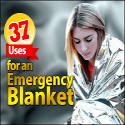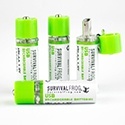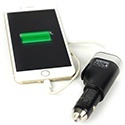Disaster happens and no one can stop it.
Be it a natural or man-made disaster, even a viral outbreak, the least we could do is to prepare for it so the impact will be less severe.
And once it strikes, the first 72 hours of survival will likely be the most critical.
Whether it be finding those who got lost during the disaster, rescuing those who got stuck inside a building, or treating those who have immediate life-threatening conditions, how each one will use their time will matter.
But it could take time before rescuers reach us if it’s a major disaster.
So the question is, how can we survive after a disaster on our own?
Of course, it is important to prepare and practice way before a disaster occurs.
Though in reality, no one really knows what to anticipate, it is still better to have preparations as this will help a lot to be calm and again, to lessen the impact of a disaster.
Make sure to read emergency preparedness articles, you may check our PREPARATION blogs here, that focus on how to become self-sufficient and what to do in different scenarios or disasters.
Take time to stock up on emergency survival kits for you and your loved ones.
We also recommend going over your survival plan at least twice a year with your family and friends.
Still not sure where to start?
We have compiled below some tips to help you survive after a disaster on your own:
-
Stop, think, and don’t panic!
Whatever disasters can be, be it natural or man-made, they are surely unexpected and overwhelming. And because a disaster is always life-threatening, panic, stress, anger, and frustration will always make the situation worse.
So after a disaster occurs, take a deep breath first, and stick to your preparedness plan. Check your family’s safety, then observe your surroundings. Assess immediate problems and dangers. Finally, make a plan on how to take care of the problem.
Note that if you let your panic overtake your mindset, you will just make the situation worse, thus, it will put you and your family in more danger.
-
Provide first-aid if necessary
After assessing your surroundings, check if there is someone who needs first-aid. If anyone is badly hurt or bleeding, do what you can to prevent blood loss before calling the 911 hotline.
It is very important to help everyone stay calm no matter what situation you are in.
When building your first aid kit, make sure to have all of the essentials for any disaster plus warm clothes or wool blankets to retain heat. And make sure to place the kit in an area where you can easily grab it.
-
Find a shelter or evacuation place
Whenever a disaster strikes, assess the location wherever you are to see how safe it is. If you are inside your house or a building and it is falling or close to falling apart, get out!
If the disaster is something you can prepare first, find a safe location to evacuate before it strikes. This should be included in your plan because finding an evacuation place will depend on each disaster. So you have to identify the disasters that usually take place in your area so you can find shelter for each disaster.
-
Signal for help
Once disaster strikes, signaling for help could be difficult. But don’t let that discourage you.
Make sure you have a whistle, flashlight, reflective mirrors, or bright clothing in your go bag. If possible, start a fire to signal for help but make sure to be cautious because it could be dangerous in a place you’re at.
-
Find drinkable water
Staying hydrated is very important to anyone’s survival since it’ll keep you alive. If there’s a chance you cannot locate your go bag, boil, filter, or purify the water you can find it first to make it drinkable. It is important to avoid being dehydrated while in the middle of a crisis.
-
Prepare your emergency money
Once you know that you are safe from the disaster, the next few days should be how you will provide food for your family.
If it’s a major disaster, the majority of the establishments in your area could be closed or non-operational. So it will be hard for anyone to find and buy food. The best that you can do is use whatever resources you can get in your area. Check this Lost Ways, and learn how our forefathers’ survived in a time when there is no technology like electricity yet.
If it’s something like a disease outbreak and there’s a lockdown, most likely, supermarkets are still open. But of course, you need to have money to buy food and necessities for your family.
Do you have an emergency fund?
If none yet, then you must consider having this as this will take a very important role in your survival after a disaster. Although the government has plans and funds on helping those in need after a disaster, it will never be enough especially if the recovery time will be weeks or worst, months.
There could be times that you and your family will be on your own. Work could be suspended that you won’t be able to get your paycheck.
So, how are you going to survive without money?
That’s why it is best if you have emergency money.
Whatever disaster it is, if you let yourself be caught off-guard, your survival rate would be very low. That’s why preparation is a must!
You should not always depend on your survival on other people. It is your responsibility to take care of your family more than anyone else. Remember, those rescuers have families also that they need to take care of, too.
So in preparation, you should always think of ways on how you and your family can survive on your own. Being knowledgeable and prepared in events like this will give you a higher rate of surviving.
We can never tell what lies ahead. As such, you should know what to do before, during, and after a disaster.











